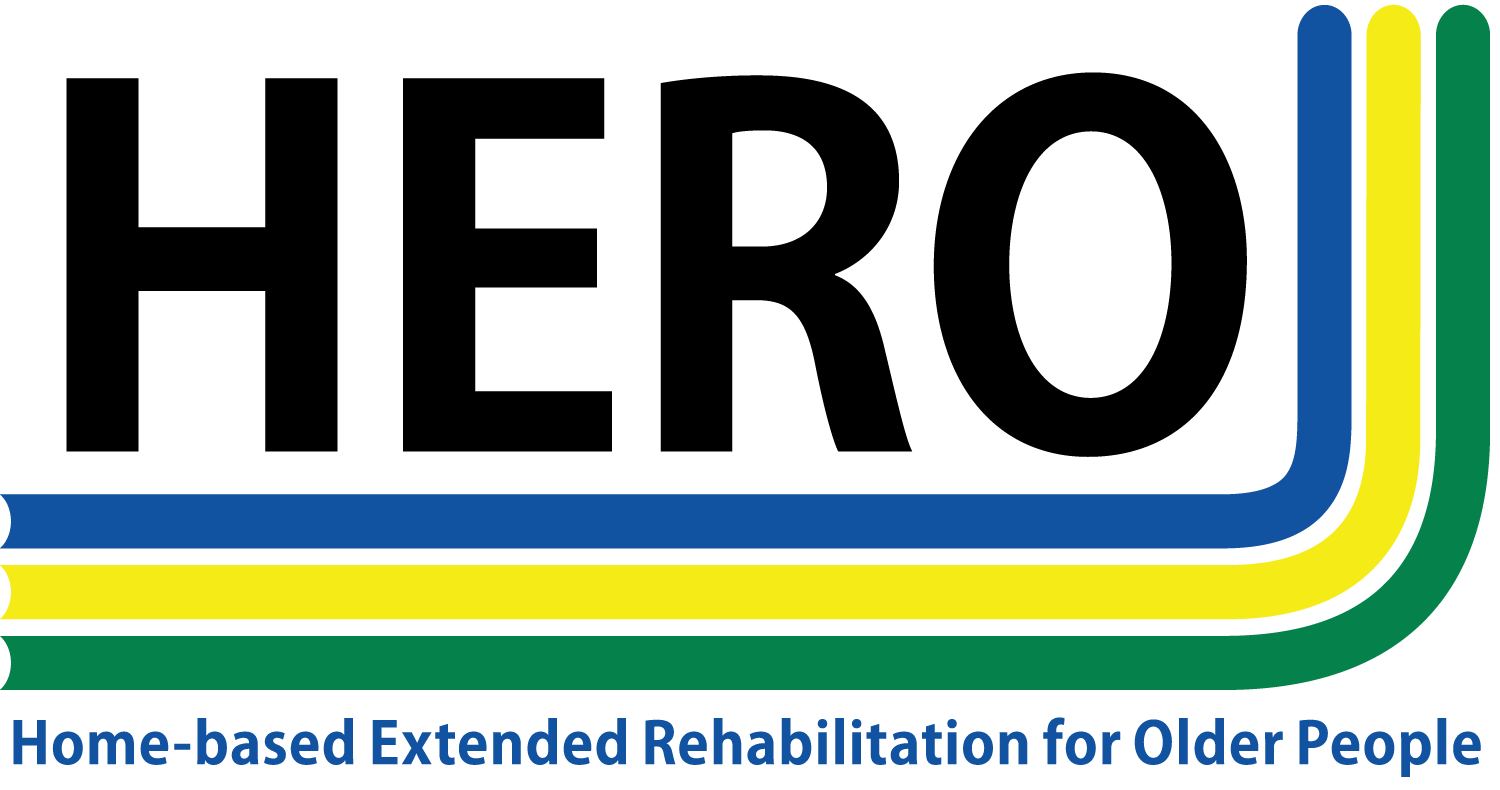Research project
Home-based Extended Rehabilitation for Older People (HERO)
- Start date: 01.03.2017
- End date: 30.05.2023

Description
Individually randomised controlled multi-centre study (with internal pilot) to determine the clinical and cost effectiveness of a home-based exercise intervention for older people with frailty as extended rehabilitation following acute illness or injury, including embedded process evaluation.
Background
Frailty is a condition characterised by reduced biological reserves and increased vulnerability to adverse outcomes including falls, disability, hospitalisation and care home admission. It develops as a consequence of an age-related decline in several physiological systems, which collectively results in a vulnerability to sudden health status changes triggered by relatively minor stressor events. The majority of older people (>65 years) in hospital have frailty and are at increased risk of readmission or death following discharge home. Sarcopenia (loss of muscle mass and strength) is a core component of frailty and periods of immobility in older age, such as that experienced during an acute illness or injury, can accelerate loss of skeletal muscle function.
Furthermore, the inflammatory response that is commonly associated with acute illness or injury can lead to catabolism of muscle protein for generation of energy and immune proteins, which can further accelerate loss of muscle mass and strength. This is especially problematic in frailty because accelerated loss of skeletal muscle function can compromise the capability to perform activities of daily living (e.g. walking, dressing, toileting, climbing stairs), jeopardising successful functioning in the home environment, which may lead to a requirement for increased home care, or admission to long-term care residence.
Study Protocol
Contact with an intermediate care service is recommended as national policy to enhance recovery after hospital admission for an acute illness or injury but people frequently do not feel ready to return home, and are at risk of subsequent readmission. The benefits of rehabilitation in intermediate care are attenuated over time.
Exercise has positive physiological effects on skeletal muscle, the brain/nervous system and the endocrine system. Additionally, observational studies have identified a consistent inverse dose-response relationship between physical activity and inflammation. Systematic reviews of exercise interventions for older people with frailty have reported evidence for improvements in mobility and activities of daily living, but few studies measured effects on quality of life and no studies reported on cost-effectiveness. Exercise programmes based on progressive strength training were important for functional improvement.
In the pilot RCT of the HOPE programme [1] 84 of 474 identified potential participants, community-dwelling frail older people, were recruited and randomised to either the intervention group (the HOPE programme + usual care) or control group (usual care). Feasibility was demonstrated, with potential for a positive clinically important intervention effect on mobility (mean between group difference in timed-up-and-go test (TUGT) 28.6s, 95% CI -8.5 to 65.9s) 14 weeks post-randomisation without adverse outcomes.
Aims & Objectives
Primary: To establish whether a home-based exercise intervention plus usual care as extended rehabilitation for older people with frailty improves health-related quality of life.
Secondary
To establish whether the intervention improves mental health.
To establish whether the intervention improves activities of daily living.
To establish whether the intervention reduces hospitalisation rates, care home admission rates, falls and overall health and social care resource use.
To establish whether the intervention is cost-effective.
To understand how the intervention is experienced and understood by providers and recipients, and explore the organisational implications of embedding and sustaining the intervention in preparation for wider NHS roll-out.
Methods
Pragmatic multi-centre individually randomised study with a two level, partially nested hierarchical design, internal pilot with progression criteria and an embedded process evaluation and parallel cost-effectiveness.
Population: Older people (aged >65) with frailty admitted to hospital following acute illness or injury then discharged home directly from hospital or from intermediate care services.
Intervention: 24 week home based exercise intervention (HOPE Programme [1]).
Timescales
Study period: 01/03/2017 – 31/05/2023
Recruitment of participants from December 2017.
Recruitment now closed as at 06/08/2021
Recruitment target: 742
Recruitment at 06/08/2021: 743
Progress: 100%
Further information
Grant applicants
Professor Andrew Clegg, Dr David Clarke, Bonnie Cundill, Professor Amanda Farrin, Professor Anne Forster, Dr Vicki Goodwin, Suzanne Hartley, Professor Claire Hulme, Phil Wright, Professor John Young
Collaborators
Academic Unit of Elderly Care and Rehabilitation, University of Leeds.
Bradford Institute of Health Research, Bradford Royal Infirmary, Bradford Teaching Hospitals NHS Foundation Trust
Clinical Trials Research Unit, Leeds Institute of Clinical Trials Research, University of Leeds.
Academic Unit of Health Economics, Leeds Institute of Health Sciences, University of Leeds.
University of Exeter Medical School.
For further information please contact Project Lead Professor Andrew Clegg or Trial Manager Matthew Prescott
This summary presents independent research funded by the National Institute for Health Research Health Technology Assessment Programme (NIHR HTA) (Grant Reference Number: 15/43/07). The views expressed are those of the author(s) and not necessarily those of the NIHR or the Department of Health and Social Care.
Reference
Clegg A, Barber S, Young G, Iliffe S, Forster A. The Home-based Older People’s Exercise (HOPE) trial: a pilot randomised controlled trial of a home-based exercise intervention for older people with frailty. Age and Aging 2014; 43: 687-695. (PDF)

